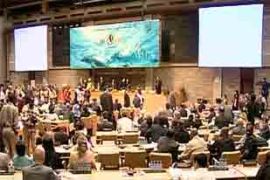Climate change hits poverty fight
Climate change is threatening to reverse gains in poverty reduction, a conference on global warming has been told.

Kibwana told the first climate change talks in sub-Saharan Africa: “We face a genuine danger that recent gains in poverty reduction will be thrown into reverse in the coming decades, particularly for the poorest people of the world and especially those in the continent of Africa.“
A recent report by Sir Nicholas Stern, a British economist, which said that global warming could have a socio-economic effect equivalent to the two world wars, is expected to stimulate debate.
China and India, along with the United States, were identified in the report as nations whose backing is crucial for a global solution to climate change.
Kyoto Protocol
The 1997 Kyoto protocol requires 35 industrialised countries to reduce their emissions by five per cent from 1990 levels by 2012.
A UN report last week indicated that many countries were struggling to meet their targets.
Industrialised nations’ emissions declined in the 1990s after the collapse of the Soviet bloc, but now those economies are rebounding, contributing to a 2.4 per cent rise in emissions by all industrialised nations between 2000 and 2004, the report said.
In Nairobi, the Kyoto countries will continue talks on what kind of emissions, targets and timetables should follow 2012.
Many are waiting to see whether the United States, which accounts for 21 per cent of the world’s greenhouse gases, will submit to a mandatory regime of cutbacks.
Scientific uncertainty
George Bush, the US president, once cited scientific uncertainty about climate change in rejecting the Kyoto protocol.
|
“We are all gathered this morning on behalf of mankind because we acknowledge that climate change is rapidly emerging as one of the most serious threats humanity will ever face.” |
Today “the science is no longer contested,” Achim Steiner, head of the UN environment programme, said on Sunday.
In fact, he said, the scenarios of five or 10 years ago “have had to be revised not downward, but upward”.
But the Bush administration still objects to Kyoto-style mandates because, it says, they will affect US economic growth and because poorer countries are exempted from the controls.
Much of the conference will be devoted to technical matters, such as organising the Adaptation Fund, intended to help poorer countries to deal with climate change by financing the building of walls against rising seas, for example, or switching to drought-resistant crops.
Threat to Africa
Africa is the continent expected to suffer most from shifting climate zones and droughts, such as the one now in its fourth year in East Africa.
“Sub-Saharan Africa is heavily dependent on agriculture,” Awori said. “Climate change will greatly reduce recent gains made in poverty eradication.”
Experts will also use the 12th session of the Conference of the Parties to the UN Framework Convention on Climate Change to deliver the latest scientific assessment of the situation and its likely costs, and corporations already involved in the carbon clean-up will be promoting their goods and services.